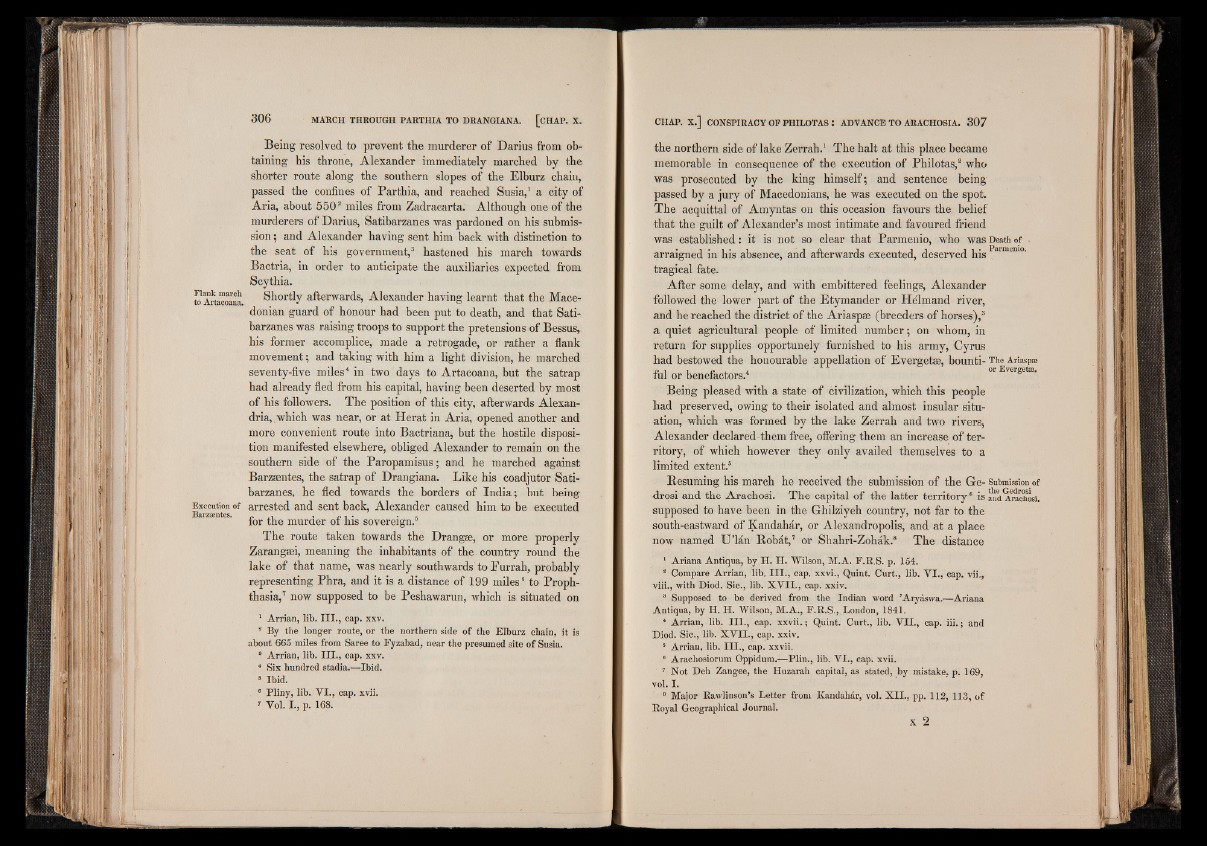
Being resolved to prevent the murderer of Darius from obtaining
his throne, Alexander immediately marched by the
shorter route along the southern slopes of the Elburz chain,
passed the confines of Parthia, and reached Susia,1 a city of
Aria, about 5502 miles from Zadracarta. Although one of the
murderers of Darius, Satibarzanes was pardoned on his submission
; and Alexander having sent him back with distinction to
the seat of his government,3 hastened his march towards
Bactria, in order to anticipate the auxiliaries expected from
Scythia.
t o A r t a m a Shortly afterwards, Alexander having learnt that the Macedonian
guard of honour had been put to death, and that Satibarzanes
was raising troops to support the pretensions of Bessus,
his former accomplice, made a retrogade, or rather a flank
movement; and taking with him a light division, he marched
seventy-five miles4 in two days to Artacoana, but the satrap
had already fled from his capital, having been deserted by most
of his followers. The position of this city, afterwards Alexandria,,
which was near, or at Herat in Aria, opened another and
more convenient route into Bactriana, but the hostile disposition
manifested elsewhere, obliged Alexander to remain on the
southern side of the Paropamisus; and he marched against
Barzaentes, the satrap of Drangiana. Like his coadjutor Satibarzanes,
he fled towards the borders of India; but being
Execution of arrested and sent back, Alexander caused him to be executed
Barzaentes. „ ,, , n , . , tor the murder ot his sovereign.
The route taken towards the Drangae, or more properly
Zarangaei, meaning the inhabitants of the country round the
lake of that name, was nearly southwards to Eurrah, probably
representing Phra, and it is a distance of 199 miles6 to Proph-
thasia,7 now supposed to be Peshawarun, which is situated on
1 Arrian, lib. I I I . , cap. xxv.
s By the longer route, or the northern side of the Elburz chain, it is
about 665 miles from Saree to Fyzabad, near the presumed site of Susia.
8 Arrian, lib. I I I ., cap. xxv.
4 Six hundred stadia.—Ibid.
5 Ibid.
6 Pliny, lib. V I., cap. xvii.
7 Vol. I ., p. 168.
the northern side of lake Zerrah.1 The halt at this place became
memorable in consequence of the execution of Philotas,2 who
was prosecuted by the king himself; and sentence being
passed by a jury of Macedonians, he was executed on the spot.
The acquittal of Amyntas on this occasion favours the belief
that the guilt of Alexander’s most intimate and favoured friend
was established: it is not so clear that Parmenio, who was Death of .
arraigned in his absence, and afterwards executed, deserved his rmuuo-
tragical fate.
After some delay, and with embittered feelings, Alexander
followed the lower part of the Etymander or Hélmand river,
and he reached the district of the Ariaspse (breeders of horses),3
a quiet agricultural people of limited number; on whom, in
return for supplies opportunely furnished to his army, Cyrus
had bestowed the honourable appellation of Evergetae, bounti- The Ariaspse
o i i , 4 or Evergetso. lul or benefactors.
Being pleased with a state of civilization, which this people
had preserved, owing to their isolated and almost insular situation,
which was formed by the lake Zerrah and two rivers,
Alexander declared-them free, offering them an increase of territory,
of which however they only availed themselves to a
limited extent.5
Resuming his march he received the submission of the Ge- Submission of
drosi and the Arachosi. The capital of the latter territory6 is and AradSsi.
supposed to have been in the Ghilziyeh country, not far to the
south-eastward of Kandahár, or Alexandropolis, and at a place
now named U ’lán Robát,7 or Shahri-Zohák.8 The distance
1 Ariana Antiqua, by H . H. Wilson, M.A. F.R.S. p. 154.
s Compare Arrian, lib. I I I . , cap. xxvi., Quint. Curt., lib. V I., cap. vii.,
viii., with Diod. Sic., lib. X V I I ., cap. xxiv.
8 Supposed to be derived from the Indian word ’Aryáswa.—Ariana
Antiqua, by H. H. Wilson, M.A., F.R.S., London, 1841.
4 Arrian, lib. I I I ., cap. x x v ii.; Quint. Curt., lib. V II., cap. i ii . ; and
Diod. Sic., lib. X V I I ., cap. xxiv.
5 Arrian, lib. I I I ., cap. xxvii.
6 Arachosiorum Oppidum.—Plin., lib. V I., cap. xvii.
7 Not Deh Zangee, the Huzarah capital, as stated, by mistake, p. 169,
vol. I.
8 Major Bawlinson’s Letter from Kandahár, vol. X I I ., pp. 112, 113, o f
Royal Geographical Journal.
x 2